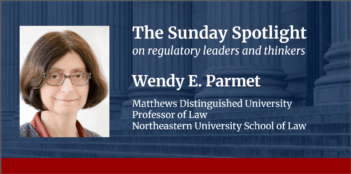
The government’s response to COVID-19 highlights the importance of expertise and cooperation in regulation.
In a country that is still suffering from the wounds of apartheid, a system of government that imposed racially-based, oppressive regulation of every detail of people’s lives, the imposition of sweeping restrictions in response to the COVID-19 pandemic—while certainly not comparable—is nevertheless particularly troubling for South Africa’s young democracy.
The South African government declared a national state of disaster on March 15. The accompanying regulations—which affect every aspect of public life—as well as the national lockdown announced on March 27 impose significant restrictions on the freedoms that South Africans obtained only 25 years ago upon democratization.
Furthermore, as South Africa is one of the world’s most unequal societies, its people’s response to and ability to respond to the imposed restrictions are highly unequal. Some are dealing with the stay-at-home injunction in leafy suburbs with their nuclear families, in stand-alone homes, shopping online, and having groceries delivered to the door. This stands in stark contrast to the experience of people living in one of South Africa’s peri-urban informal settlements, often sharing single-room homes with multiple generations of family members, whose access to public services like sanitation and water is only in communal form and whose access to food is through informal traders.
Against this backdrop, the regulatory response to the COVID-19 pandemic in South Africa is noteworthy for two primary reasons: first, because of how the government has justified sweeping restrictions with scientific expertise, and second, because of the challenges the government faces due to the lack of horizontal regulatory coordination.
The relative calm with which South Africans have accepted the severe restrictions on their daily lives demonstrates the authority enjoyed by the government based on a culture of justification.
Early on in South Africa’s transition to democracy, a leading administrative law scholar, Etienne Mureinik, typified the constitutional transition as one from a culture of authority to a culture of justification. That is, a shift from governance based on command and fear, to one in which all exercises of power are expected to be justified and in which leadership is respected based on the cogency of the explanations for decisions.
South Africa has come a long way toward establishing a culture of justification, as is evident in the calm acceptance of government’s far-reaching COVID-19 interventions, including the across-the-board political support the government enjoys and the praising of President Cyril Ramaphosa’s leadership in this current crisis.
The government’s responses to the crisis, as well as the people’s response to government intervention efforts, are much different from South Africa’s experience of the HIV/AIDS epidemic. The HIV/AIDS denialism that characterized the government’s response under President Thabo Mbeki’s Administration caused relentless public condemnation. Mbeki’s government only changed course after arduous public interest litigation resulted in a bruising defeat of the government’s policy in the Constitutional Court, the nation’s highest court.
The difference between the COVID-19 response and the HIV/AIDS response highlights an important lesson in effective regulatory justification and the role of experts in public policy-making.
One of the key differences between Mbeki’s handling of the HIV/AIDS epidemic and Ramaphosa’s response to COVID-19 has been each President’s reliance on experts and scientific input.
Mbeki, and especially his Health Minister Manto Tshabalala-Msimang, eschewed leading scientific opinion about how to address the HIV/AIDS epidemic. Instead, Mbeki’s Administration formulated the government’s response based on widely discredited notions about proper treatment—for instance, notoriously promoting remedies consisting of African potato and garlic rather than antiretrovirals. It is estimated that Mbeki’s approach resulted in 330,000 premature deaths.
The Mbeki Administration’s explanations for its approach—with its explicit reliance on a questionable scientific basis—played a major role in the widespread opposition to the government’s response and contributed to the eventual judicial mandate for a new regulatory approach.
In stark contrast, the Ramaphosa Administration’s approach to COVID-19 regulation is firmly led by expert, scientific guidance. The government established a COVID-19 Ministerial Advisory Committee composed of internationally respected scientists and chaired by world-renowned epidemiologist Salim Abdool Karim.
In taking and announcing regulatory interventions, the government has been careful to assign scientific explanations to these regulations. Members of the Ministerial Advisory Committee, and Karim especially, have become just as familiar as Health Minister Zweli Mkhize when it comes to communicating government intervention policies to the public. There can be little doubt that this approach has generated high levels of trust and support for the government’s actions.
These examples of South African public health responses illustrate how the relationship between policy and science can make or break a regulatory program in a culture of justification.
The South African government’s use of scientific expertise to justify COVID-19 response policies highlights the ongoing debate about the role of experts in regulatory programs. This is, of course, not a new debate. Although the COVID-19 response will not provide the last word on the role of experts in government policymaking, the current crisis provides an opportunity to reflect on the appropriate relationship between political action and the expertise it is based on.
As much as niche scientific expertise seems to drive the success of regulatory interventions in South Africa, such a focus on experts may risk preventing the government from adopting a more holistic regulatory approach. Another noteworthy element of South Africa’s response is the ongoing, almost daily regulatory adjustment, which speaks to the challenges of regulatory coordination in a highly complex environment. As the continuous adjustment of regulations aimed at managing the pandemic demonstrates, dealing with this crisis is complex and calls for high levels of regulatory coordination.
This complexity poses particular challenges for South Africa, where the government traditionally addresses regulation from a sector-specific, vertical approach. Industry-specific government departments have statutory authority to implement particular regulatory interventions, which they do with minimal interaction with other departments. Coordination usually happens only at a very high level within the Cabinet, and, as a result, there is very limited regulatory coordination at a horizontal level between departments over the details of regulatory programs.
The shortcomings of such an approach are evident in the COVID-19 context, which calls for integrated, holistic regulatory intervention.
The government has issued regulations under the Disaster Management Act of 2002. Issued on March 18, these regulations had been amended five times as of April 20. These regulations are the main instrument of the government’s COVID-19 response, authorizing members of Cabinet to “issue directions to address, prevent, and combat the spread of COVID-19 in matters falling within his mandate.”
Despite the departments’ receipt of a broad grant of regulatory authority to address sector-specific issues, the regulations do not provide for coordination at the level of implementation.
It is at the implementation level, for example, that provision for continued pay-out of social grants should be aligned with other government-imposed health measures in order to avoid inadvertently harming the 11 million vulnerable members of society who depend on social assistance. These measures include restrictions on gatherings and people’s movement, the operation of public transport, the types of businesses that may operate and when, and the continued importation, distribution, and sale of fuel. In light of the challenges that coordinating response efforts presents, it is no wonder that public transport directions, for example, have been amended three times since March 18.
The COVID-19 pandemic starkly illustrates the impracticability, even senselessness, of the continued vertical concentration of regulatory structures. The crisis calls for renewed attention, at an institutional dimension, to regulatory mechanisms with the particular aim of achieving higher levels of coordination and integration across the entire regulatory state. Such coordination would provide for enhanced responses to major crises such as COVID-19 and should be emphasized in pursuit of accelerated development.
This essay is part of an ongoing series, entitled Comparing Nations’ Responses to COVID-19.




